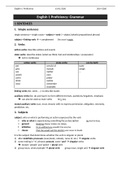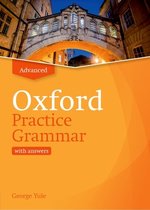English 1: Proficiency 15/01/2020 2019-2020
English 1 Proficiency: Grammar
1 SENTENCES
1. Simple sentences
single sentence = single cause = subject + verb ( + object/adverb/prepositional phrase)
subject + linking verb + complement She wasn’t ready.
2. Verbs
action verbs: describe actions and events
state verbs: describe states (what we think, feel and relationships = possession)
not in continuous
action verbs state verbs can be both
eat consist of taste
give include weigh
see matter …
watch own
swim prefer
drink realize
read remember
resemble
linking verbs (be, seem, …): to describe states
auxiliary verbs (be, do and have): to form different tenses, questions/negatives, emphasis
can also be used as main verbs He is lazy.
modal auxiliary verbs (can, must, should, will): to express permission, obligation, necessity,
prediction, etc.
3. Subjects
subject: who or what is performing an action expressed by the verb
who or what is experiencing something/focus description He lost his keys.
gerund Studying always makes me sleepy.
infinitive To go without you wouldn’t be any fun.
clause That she would win the election was never in doubt.
it is the subject that determines whether the verb is singular or plural
1) after indefinite pronouns (everybody, nobody, none of, etc.) singular verbs
2) some ending in ‘-s’, phrases amount, some ‘and’ singular verbs
except: ‘people’ and ‘police’ = plural verb
3) group noun, several people plural verb group noun, single unit singular verb
,English 1: Proficiency 15/01/2020 2019-2020
4. Objects
transitive verbs
an action that affects an object
verbs that have objects a feeling or experience caused by an object
can be used in the passive
carry, catch, heat, believe, hate, sell, etc.
intransitive verb
simple events, actions and sounds
verbs without an object
cannot be used in the passive
arrive, depart, fall, moan, rain, faint, etc.
with or without objects
cook, draw, die, smile, dance, fight, meet, hug, etc.
two objects: direct object and indirect object
direct object: a person or thing that undergoes the action of a transitive verb
indirect object: the recipient of the direct object
order:
1) shorter objects longer objects
2) pronouns: indirect object pronoun first
3) ‘describe’/’explain’: indirect object after preposition
4) ‘cost’: indirect object after verb
5. Linking verbs
linking verbs (copulas or copular verbs): followed by a complement that describes or
identifies the subject of the sentence
complements:
adjectives His parents were Welsh.
noun phrases I am a student.
prepositional phrases Sometimes I feel like an idiot.
result of change become, get The world is becoming more crowded.
describing actions become, get They won’t get married.
change go, turn Our dog is going blind.
change of state turn into + noun phrase She turned into a butterfly.
slower change come, grow + adjective Dreams come true.
gradual change come, grow + infinitive We came to see things as she did.
situation not changing keep, remain, stay She kept busy.
, English 1: Proficiency 15/01/2020 2019-2020
6. Compound and complex sentences
compound sentence: has two or more clauses joined by coordinating conjunctions
coordinating conjunctions: and, but, or
ellipsis: leaving out the subject and/or other parts of the sentence (to avoid excessive repetition)
emphasize relationship between two clauses combination of conjunctions
1) addition They not only clean houses, but also do repairs.
2) alternative You can either go with us or stay here alone.
3) combination You can both turn the TV on and change channels with the remote control.
4) combination of negatives I will neither sleep nor rest until this is over.
complex sentence: has two or more clauses joined by subordinating conjunctions
subordinating conjunctions: because, before, that, which, …
the same subject is repeated ! I couldn’t sleep because I was upset.
complex sentences contain:
1) relative clauses She liked the woman with whom she worked.
2) noun clauses I didn’t realize that Noah wasn’t feeling well.
3) adverbial clauses I had a shower after I ran. / If it rains, the ground will be wet.
compound-complex sentence: three or more clauses joined by both coordinating and
subordinating conjunctions
We hit a lamp post and it shattered the glass of the front door before I managed to bring the bus to a halt.
2 TENSES
1. Present tenses
present simple present continuous
permanent situations actions in progress
things that are generally true being in the middle of an activity
habits
things that happen regularly
describe current states
informal reports or instructions
when we perform an action by speaking
describe current states as permanent describe current states as temporary
be/have typical situation or state be/have temporary or special situation
present perfect present perfect continuous
an action or situation started in the past an activity in progress up to the present
which connects to the present actions which go over a period of time
‘at any point up to now’ up to the present
with state verbs
series of separate actions up to the present continuous action up to the present
the present the result of an earlier a process going on from earlier up to
action the present





